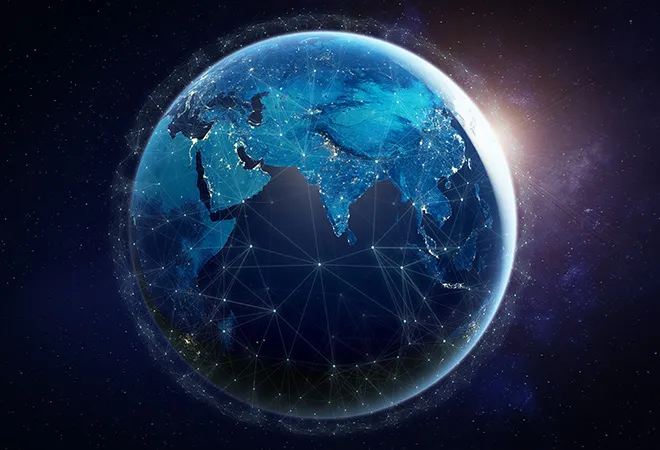-
CENTRES
Progammes & Centres
Location
The evolving contours of modern geopolitics is still in a state of flux, and there is wisdom in accepting the notion that the end result is perhaps indeterminable. The age of disruption is here, countries that thrive on disorder may do well in the short term, while nations who invest in stability may well define the future of globalisation and, indeed, the new world order

As such, the postwar liberal international order—underwritten by the West under US leadership—had been facing an existential crisis since the turn of the century, with wars in South and West Asia and the Financial Crisis all challenging the old arrangements and aiding the rise of `China as a new revisionist power. And then the Virus from Wuhan exploded on the world stage, accelerating the processes that were already influencing modern geopolitics, a few of which are discussed here.Global institutions had weakened, and the benefits of investing political will into their mechanisms had greatly receded. The coronavirus further exacerbated this: While nations scrambled to respond to this fast-spreading disease, their immediate reaction was to look inwards, go at it alone or with trusted partners, and engage with the international community only for self-serving purposes. At the end of the day, all were ‘Darwinian’ and privileged their own survival without consideration and care for others. This is typified by the perverse ‘Vaccine Access’ world map.
Second, the hard-won consensus on the frameworks underpinning multilateralism and globalisation is undergoing a dramatic restructuring. The 2008 global financial crisis, followed by the COVID-19 pandemic, have exposed the fragility of global economic interdependence. The growth of hyper-nationalism and populist politics assess globalisation and multilateralism as arrangements that impinge on the sovereign choices of a state. As such, there is potential for the creation of a ‘gated globalisation’—a globalisation that is less free and less open than before. Economic policies are no longer solely dictated by economic principles; they are now guided by strategic considerations, political trust, climate, health and technological threats. Countries, such as the UK, US and India have introduced trade restrictions, investment screening mechanisms, sanctions and monetary policies to reflect these new considerations. China had already perfected their own model of perverse global integration. The disillusionment with multilateralism can be directly attributed to institutional inertia, lack of reforms and capture by vested interests, which continue to hamper decision making before these organisations. Countries are, therefore, leaning towards smaller groupings to forge fluid, issue-specific partnerships, which can expedite cooperation between like-minded countries. While this can be one way to overcome the malaise of multilaterals, they may hamper the development of broader and cohesive international strategies for ‘global bads’—from COVID-19 to climate change—which require the participation and commitment of all. The pandemic is not over till all are vaccinated and secured and the threat of climate change is not going to recede by unilateral actions of any single state. The ongoing restructuring calls for the need for new arrangements that can redress the inefficiencies of multilateralism and globalisation, without diminishing their larger benefits. Can a ‘consortium of plurilaterals groupings’ agree to a common minimum framework to address the challenges that confront us all even as they engage within their own clubs to maximise their economy and security? In the midst of this churn, geopolitics has been reoriented to accommodate new actors, and emerging factors and considerations. Modern geopolitics is increasingly influenced by geoeconomics and geo-technology. Important works, such as War by Other Means, talk of the systemic use of economic instruments to achieve geopolitical objectives—a form of statecraft that was present during the Marshall plan, and is present today as well through China’s ‘chequebook diplomacy’ and more generally the BRI.The outcome of the US-China rivalry remains to be seen, and countries caught at the intersection of this evolving dynamic must take into account how they readjust their approach to this new age of geopolitics. Russia too will be asked some tough questions and will have to make some difficult choices
If the medium is the message, then technology is the future of our politics. The advent of the Fourth Industrial Revolution (4IR) has resulted in the development of technologies that can be both a boon and a bane for humankind. While America was at the forefront of technological leadership in the recent past, this is being challenged by China as it invests heavily in emerging and dual-use technologies such as Artificial Intelligence, Quantum Computing, and biotechnology. First movers may not only take the mantle of technological leadership, but will also become the providers for other countries, creating asymmetric dependencies. ‘GeoTech’ opens a new realm of interstate competition, where concerns of national security and strategic autonomy implicate technology choices and arrangements. In an increasingly digital world, the capture of data—and not territory—and the compromise of critical information infrastructure—and not state borders—are the new security challenges for nations. As an individual’s attention, eyeballs and personal data become the coveted political prize, will the next domain of conflict be the human form and how we will protect it?Modern geopolitics is increasingly influenced by geoeconomics and geo-technology. Important works, such as War by Other Means, talk of the systemic use of economic instruments to achieve geopolitical objectives—a form of statecraft that was present during the Marshall plan, and is present today as well through China’s ‘chequebook diplomacy’ and more generally the BRI
The views expressed above belong to the author(s). ORF research and analyses now available on Telegram! Click here to access our curated content — blogs, longforms and interviews.

Samir Saran is the President of the Observer Research Foundation (ORF), India’s premier think tank, headquartered in New Delhi with affiliates in North America and ...
Read More +